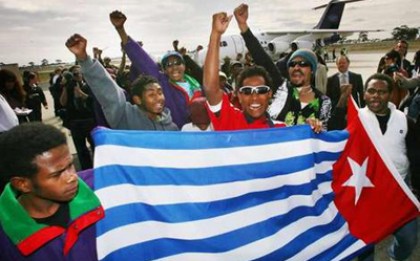
Supporters of self-determination with the Morning Star, the West Papuan liberation flag. Photo: PMC
Pacific Scoop:
Report – By PMC Newsdesk.
A New Zealand-based NGO Indonesia Human Rights Committee has urged the Government to act with urgency to help stop violence and killing in West Papua.
Indonesia Human Rights Committee spokesperson Maire Leadbeater has written to New Zealand’s foreign minister Murray McCully stating: “New Zealand should act urgently on behalf of its Melanesian neighbours to avert further bloodshed.” In her letter, Ms Leadbetter writes: “Local people report that they now hear gunfire everyday and cannot continue with their daily pursuits. A curfew is in place and the local roads are patrolled by the army and the Brimob paramilitary police who have set up check points where everyone is interrogated and asked to show ID.”
Indonesia Human Rights Committee’s letter to Murray McCully follows:
-
Indonesia Human Rights Committee,
PO Box 68-419,
Auckland 1125
Hon Murray McCully,
Minister of Foreign Affairs,
Parliament Buildings,
Wellington.
16 June, 2010
Dear Mr McCully,
Thank you for your letter of 26 May, 2010. We are pleased that New Zealand officials will take up the case of Filep Karma’s lack of adequate health care and we hope for a positive outcome.
We are also deeply concerned about the reports that violence is escalating in the Central Highlands Region of Puncak Jaya. We understand that military operations are under way already in the Tingginambut district and that there are fears of a wider and more intensive campaign after June 28.
The people in this are have been subject to repeated military operations usually referred to as ’sweeping operations’. The residents have little choice but to abandon their villages and gardens and seek shelter in the surrounding jungle. In the past this mass evacuation has resulted in many deaths, and cases of serious malnutrition and illness, because of poor shelter, food shortage and lack of medical care.
The latest military crackdown began with an attack on the suspected base of the Free Papua Movement (OPM) and the killing of a local leader Werius Telenggen in Yambi.
We are in receipt of a number of reports from local people and also from the Indonesian chapter of Human Rights Watch.
Local people report that they now hear gunfire everyday and cannot continue with their daily pursuits. A curfew is in place and the local roads are patrolled by the army and the Brimob paramilitary police who have set up check points where everyone is interrogated and asked to show ID. (Many villagers have never held an Indonesian ID card.) There are reports that many houses and even Churches have been burnt and that the security forces are arresting ordinary people at random and holding them without any evidence.
Human Rights Watch Indonesia describe a humanitarian crisis and spokesperson Andreas Harsono confirms that the police are terrorising the population, destroying homes and property and detaining and questioning anyone who cannot show an ID card.
Since the Human Rights Watch media release, there has been a further killing of a police officer and an announcement of more Brimob forces being sent to the area.
The security build-up is likely to increase tensions in the area and intensify the repression of local civilians. The Highlands are known as an area where there is strong popular support for self-determination but past experience indicates that security force crackdowns do nothing to change hearts and minds or to end a cycle of violence.
In West Papua there is a strong and growing movement for a dialogue between West Papuan representatives and the Indonesian Government. This initiative has the support of prominent academic and Church leader, Fr Neles Tebay as well as the support of the well-respected Indonesian NGO, LIPI (Indonesian Institute of Sciences). Recently the MRP (Majelis Rakyat Papua, the Papuan People’s Assembly) held a consultation with indigenous civil society leaders and one of the key recommendations from this forum was for dialogue to take place immediately between Papua and the central government, facilitated by a neutral third party.
We urge that the New Zealand Government appeal to the Indonesian authorities to end the military and police crackdown in the Central Highlands, and instead respond to the appeals from West Papuan leaders for an immediate start to peaceful dialogue. Peaceful dialogue has the potential to address grievances that have deep historical roots and also to help to resolve the devastating crisis in the Central Highlands.
New Zealand should act urgently on behalf of its Melanesian neighbours to avert further bloodshed,
Yours sincerely,
Maire Leadbeater
For the Indonesia Human Rights Committee.
